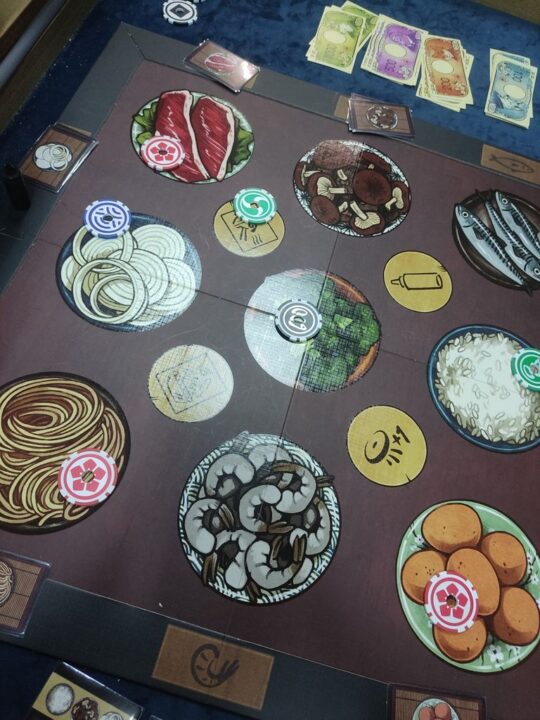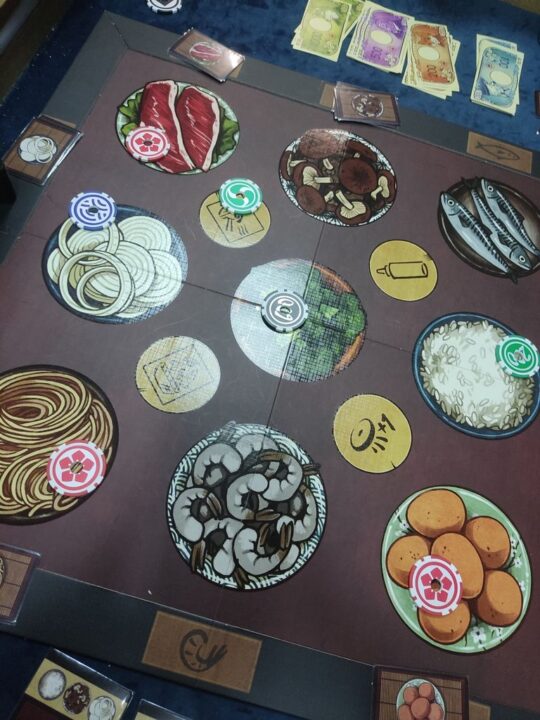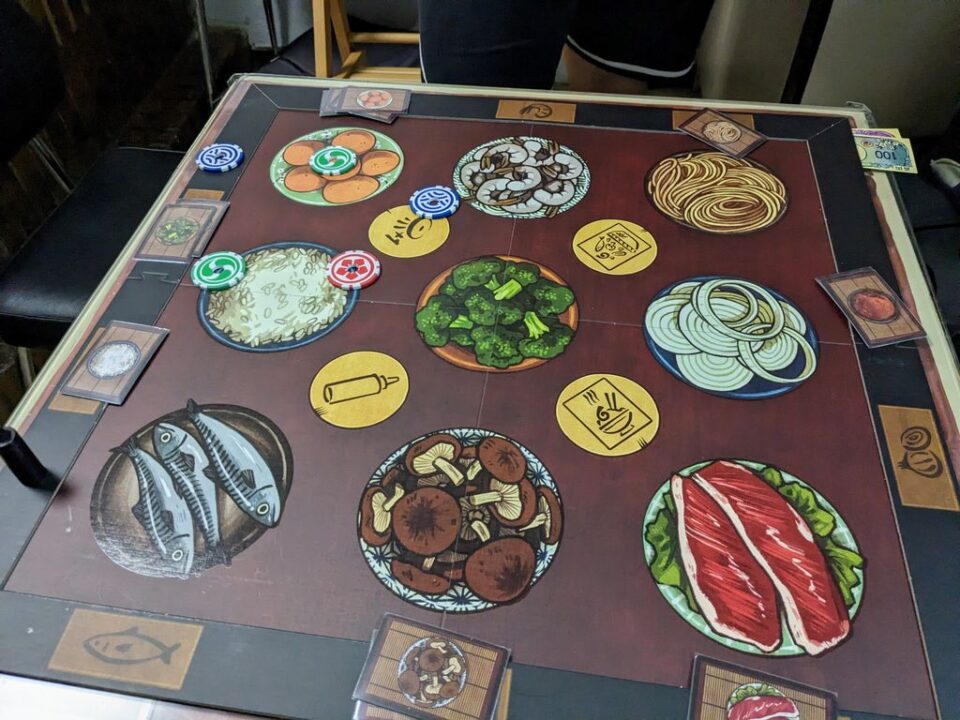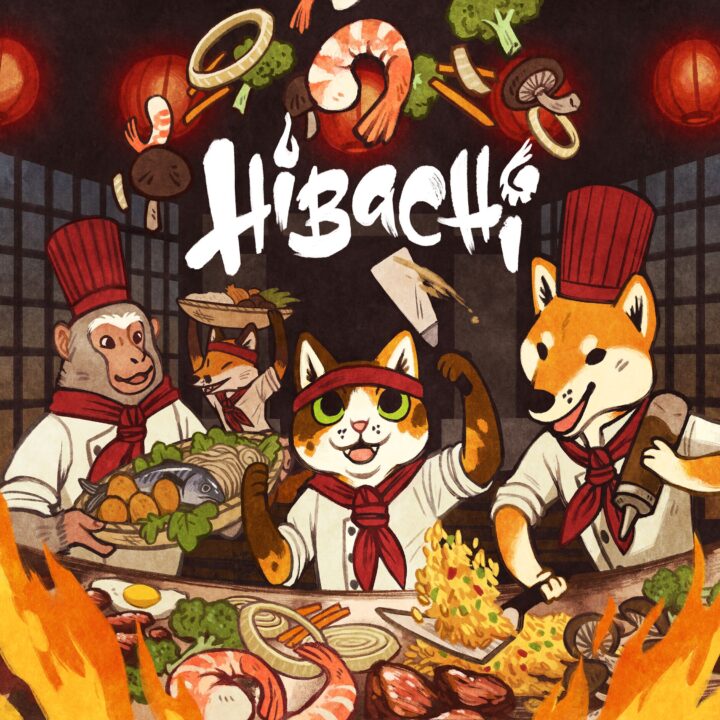Overview
Looking for a game that’s as spicy as it is fun? Well, I’ve tossed my chips into the ring and gave Hibachi a whirl, and I’m here to tell ya, this review is gonna be hot! Hibachi is a board game that’s easy to learn, a blast to play, and has that perfect mix of strategy and luck to keep you and your friends coming back for more. So, pull up a chair, grab your chef’s hat, and let’s see if Hibachi cooks up a feast or leaves us hungry for more.
How It Plays
Setting up
To set up Hibachi, lay out the board representing different food stalls. Each player gets a set of colored chips, which are their ‘throwing coins’. Then, place ingredients and three special action cards on their designated spots on the board. Choose a starting player, and you’re good to go!
Gameplay
Players take turns throwing their chips onto the board, aiming for spots that either offer ingredients they need or special actions that could help them. You can buy ingredients or steal them from other players, but if your chip lands on a spot with others, you might end up in a bidding war! Special action cards let you swap ingredients, sneak a peek at the next ingredients coming up, or even give you another throw.
Winning the game
The game ends when a player completes three high-scoring recipes or when the ingredient deck runs out. The player with the most points from their completed recipes wins. It’s all about strategic throwing and making the most of the ingredients you nab!
Want to know more? Read our extensive strategy guide for Hibachi.
Grasping the Fun: The Simplicity of Hibachi’s Gameplay and Mechanics
When I first laid eyes on Hibachi, I was curious how a game centered around the concept of being a teppanyaki chef could be engaging. Well, let me tell you, it’s all in the simplicity. This game nails an easy-to-understand setup. You’ve got your ingredients, your hibachi grill, and your rivals – all aiming to earn the title of top chef. The rules? Straightforward. Even my friend, who spends more time burning toast than cooking, got the hang of it in minutes. The beauty of Hibachi lies in its approachable mechanics. Throwing chips onto the board to collect ingredients or earn money is a blast and doesn’t bog you down with complex rules. It’s the perfect recipe for a game night, ensuring everyone is laughing and scheming right from the get-go. And if you think it’s all just tossing chips and easy wins, the strategic depth waiting in the wings will surprise you.
Next up, let’s see how Hibachi balances the sizzle of strategy with the unpredictable flip of luck.

Striking the Balance: Strategy vs. Luck in Hibachi
When you sit down to play Hibachi, you’re entering a world where both strategy and luck heat up the gameplay. While tossing chips into the cooking stations adds a fun, unpredictable element, there’s a solid layer of strategy underneath. Players need to decide when to save their chips, when to aim for specific ingredients, and how to outsmart their opponents. This blend ensures that while luck might help you in a pinch, strategic thinking is your main ingredient to victory.
However, don’t think this means the game is all serious planning. The randomness of where your chips land can lead to hilarious outcomes, keeping the mood light and fun. It’s this balance that keeps Hibachi fresh, ensuring that no two games feel the same.
Now, let’s turn up the heat and look at the game’s components and board design quality next.

Stunning Components and Board Design in Hibachi
One of the first things you’ll notice when opening Hibachi is the sheer quality of its components and board design. The game pieces feel durable and well-made, from the colorful, hefty throwing chips to the beautifully illustrated ingredients and cookware tokens. The board itself is a visual treat, capturing the bustling energy of a Japanese Hibachi restaurant with vibrant colors and intricate details. It’s clear that a lot of thought went into the design, making setup and gameplay not just intuitive but also a feast for the eyes. This attention to detail doesn’t just add to the aesthetic appeal; it enhances the entire gaming experience, making you feel like you’re really competing to be the best chef in town.
With such meticulous design put into the game’s components and board, it sets the stage perfectly for diving into the next exciting topic: the fun factor and replay value of Hibachi.

Why Hibachi is a Blast to Play Again and Again
When it comes to fun and replayability, Hibachi is a real champ. Now, my friends and I have played our fair share of games where after two rounds, you feel like you’ve seen it all. But with Hibachi, the laughter and competitive spirit keep us coming back. There’s something hilarious and thrilling about tossing those chef chips, aiming for the perfect ingredient, and sometimes spectacularly missing. It’s this blend of skill and luck, combined with quick-paced rounds, that sparks joy in every game.
The game also scales well with different numbers of players, which means whether it’s a date night or a party with pals, Hibachi fits the bill. Plus, with various strategies to explore, each playthrough feels fresh. This isn’t just a one-season wonder; Hibachi has earned a permanent spot in our game rotation.
So, do I recommend Hibachi? Absolutely. It’s easy to learn, a blast to play, and each game leaves you eager for another round. Hibachi is a must-try for anyone looking to spice up their game nights.
Conclusion
Wrapping up, Hibachi serves up a sizzling mix of strategy, luck, and fun, all cooked to perfection. With its easy-to-learn gameplay, beautiful design, and perfect blend of thinking and laughing, it’s a must-try for any game night. Sure, the luck element might spice things up a bit too much for some, but it’s all part of the game’s charm. In short, Hibachi is a deliciously entertaining game that deserves a spot on your table. So, after throwing chips around and racing to complete those recipes, I’m giving Hibachi a solid 4 out of 5 stars. It’s not just a game; it’s a party in a box. And that’s a wrap on our Hibachi review!


